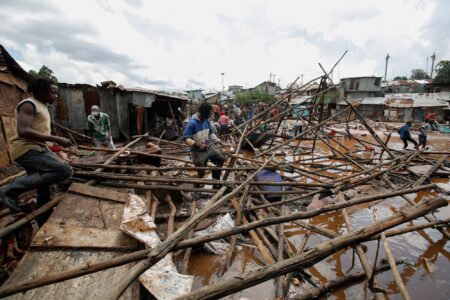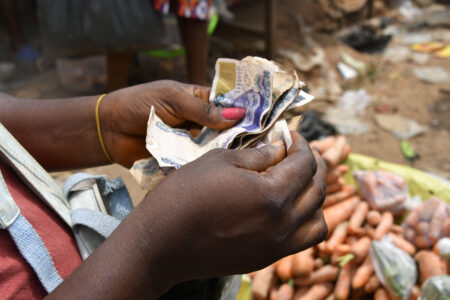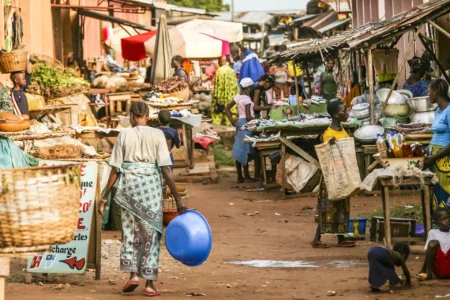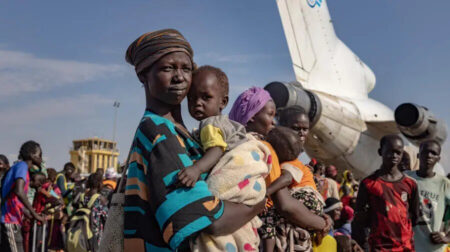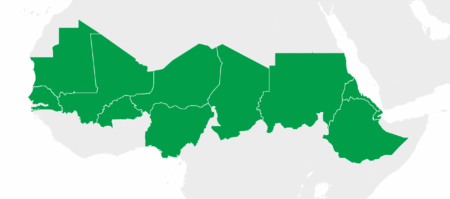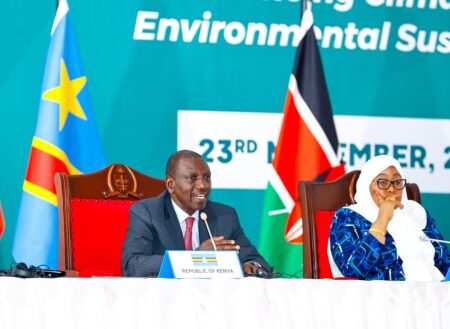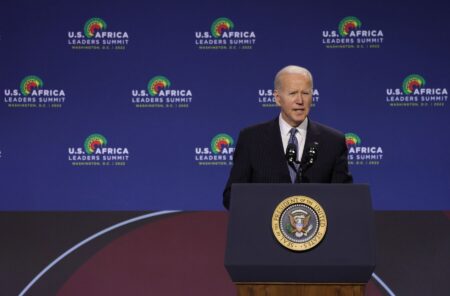- Africa’s new dawn: the rising role of digital and AI in agriculture
- Can Dangote Refinery Transform Africa Energy Ambition
- Gallup Survey: 80 per cent of Kenyan Workers Are Disengaged and Seek New Opportunities
- Madagascar Man Freed from 5KG Tumor After 15-Year Struggle
- How women in Africa are perceived and treated
- Sugar consumption in Kenya to Increase to 1.23 Million Tonnes
- Can Somalia and Turkey Oil deal Bring Change in Somaliland
- Remittances to Kenya dropped to $371.6 million in June, marking a six month low
Browsing: Climate change
- Torrential rains have caused terrible floods in Kenya, causing the death toll to reach more than 200, and more than 280,000 people affected.
- Over the years, both governments in Kenya and Tanzania have struggled to finance disaster management systems.
- Tanzania’s commercial pulse, Dar es Salaam’s economy, and infrastructure suffer from frequent and severe flooding, and the situation will worsen without major interventions.
“Tomorrow I am turning 24, and in 2030, I will be 30; seeing all these situations (floods) puts me in a scary position for my future,” Jeffrey Mboya, a Kenyan climate activist, told CNN International correspondent Larry Madowo, as flooding destroys his community.
Lost lives, destructed communities, stranded tourists, broken bridges, and closed-off roads are currently becoming the new normal in Kenya and Tanzania as the two neighboring nations experience floods and cyclones.
Torrential rains have caused terrible floods in Kenya, causing the death toll to reach more …
- The urgency to transform African food systems is not solely an agricultural or economic imperative but a moral, social, and ecological one.
- Africa is confronted with a heavy crisis of malnutrition, poverty, inequality, and unemployment. Food affordability and access are unevenly distributed, and gaps widen even further.
- Improving the performance of the food system is critical if we are to sustainably feed nearly 10 billion people by 2050 while raising farmer incomes, protecting them from climate change, and helping them to thrive.
Africa, a continent of great potential, stands at a crossroads. Africa has most of the world’s most fertile lands, immense resources, and a growing young population. However, it remains paradoxically entangled in the danger of food insecurity and malnutrition.
Challenges such as climate change, post-harvest losses, poor farming technologies, and inadequate supply chains persist. The urgency to change African food systems is not solely an agricultural or economic …
- There is a debt crisis in Africa as countries struggle to repay international loans.
- According to the World Bank, nine African countries entered 2024 in debt distress, with another 15 at high risk of distress and 14 more categorised as moderate risk.
- According to the United Nations, Africa’s public debt will stay above pre-pandemic levels in 2024 and 2025.
At 4 per cent, Africa is projected to be the second fastest-growing economic region in the world in 2024, according to a report by the International Monetary Fund (IMF). However, behind the headline figure is a less optimistic reality.
Many African countries have suffered from slow post-COVID-19 recovery, climate change shocks, worsening food security situation, political instability, weak global growth, and high-interest rates. These economic shocks have pushed over 55 million people into poverty since 2020. The situation is increasingly alarming as more than half of the continent’s countries are in …
- Global verification body Verra certifies d.light’s clean cookstove projects in Kenya, Uganda, and Nigeria.
- Initiative to distribute 600,000 clean cookstoves, which are now verified by leading certifiers as a trusted source of high-quality carbon credits.
- Launched in 2022, these projects have already positively impacted over one million lives and are on track to transform the lives of three million people by 2025.
d.light’s clean cookstove initiatives
In a landmark move that helps advance the journey towards sustainable development and environmental health in Africa, d.light, a firm that provides innovative solutions for low-income households, has achieved a milestone with its projects receiving certification from Verra as a trusted source of high-quality carbon credits.
This certification marks d.light’s clean cookstove initiatives in Kenya, Nigeria, and Uganda as crucial players in the voluntary carbon markets (VCMs), aiming to reduce carbon emissions, combat indoor air pollution, and curb deforestation.
Addressing environmental challenges, and earning
…- Following a slow recovery from the debilitating impact of COVID-19, Africa’s economic growth declined to an estimated 3.8 per cent in 2022 and later deteriorated to 3. (https://rescueresponse.com) 3 per cent in 2023.
- Africa is not immune to economic shocks and has recently faced a multi-crisis situation.
- African countries have posted more than 5 per cent output expansions in 2024.
Africas economic outlook
Before COVID-19, Africa experienced 20 years of solid growth and made tangible economic and social progress. However, the COVID crisis brought this progress to an abrupt halt, and many countries, which are under increasingly tight budget constraints, struggled to invest in essential sectors amidst recovering from the aftermath of the health crisis.
Following a slow recovery from the debilitating impact of COVID-19, Africa’s economic growth declined to an estimated 3.8 per cent in 2022 and later deteriorated to 3.3 per cent in 2023.
However, according …
- Over a decade since gaining independence, South Sudan continues to be affected by fragility, economic stagnation, and instability.
- South Sudan’s economy is clouded by production bottlenecks in the oil sector, with production dwindling in the face of limited new investment.
- The susceptibility of South Sudan to climate change and natural calamities exacerbates the nation’s economic challenges, threatening the progress of growth and development initiatives.
The Republic of South Sudan emerged as the world’s newest sovereign state and the 54th country in Africa on July 9, 2011. However, the progress of development post-independence was significantly hampered by civil war outbreaks in 2013 and 2016, which also aggravated the humanitarian crisis.
Over a decade since gaining independence, South Sudan continues to be affected by fragility, economic stagnation, and instability. Pervasive poverty is further intensified by ongoing conflict, displacement, and external shocks.
Crisis facing the oil and energy sector
Oil production is …
- Agriculture is one of the leading causes of climate change.
- Without action, emissions from food systems will rise even further, with increasing food production.
- Climate-smart agriculture offers a holistic approach to end food security.
It may surprise many that agriculture and its activities are, in fact, one of the leading causes of climate change. Agriculture is reported to be responsible for some of the highest emissions of greenhouse gases, making the sector one of the main contributors to global warming.
It strikes the environment with a double-edged sword, emitting greenhouse gases on one hand and destroying forests and marine ecosystems on the other.
According to the World Bank, agriculture is the primary cause of deforestation, threatening pristine ecosystems such as the Amazon and the Congo Basin. With the global population exploding, there is an inevitable need to increase food production, which can only be achieved by expanding agricultural activities.
This …
- The Bimalab Africa program is an innovation that brings together insurance innovators, technology partners, insurance firms, investors, and regulators.
- BimaLab Africa will expand its footprint to accelerate 55 insurtechs in 15 African countries.
- The initiative is dedicated to tackling pressing issues such as climate change, health, and gender disparities in the sector.
The Bimalab Africa Insurtech accelerator program has received $600,000 (about KSh85.9 million) in funding to expand its operations across Africa. Following the fresh financing round by the Swiss Re Foundation, the program is now set to grow to cover 15 countries across the African continent from the initial 10 countries covered in the 2023 program.
The program offers hands-on venture-building support to high-impact Insurtech start-ups that improve the resilience of underserved and climate-vulnerable communities.
The initiative is dedicated to tackling pressing issues such as climate change, health, and gender disparities while also addressing the challenges micro, small, …
- There is a Climate Funding gap of 40 billion dollars in blue carbon, yet no Kenyan firms are undertaking it.
- According to the World Bank, Kenya remains vulnerable to frequent climatic shocks that pose significant economic risks.
- The East African country has been gravely affected by changing weather patterns and a fall in disposable income available for necessities.
Despite their considerable potential, Kenya is foregoing billions of dollars in untapped climate financing opportunities. While many startups are entering this sector, industry experts argue that the current figure remains insufficient to combat climate change adequately.
Pangea Accelerator, an investment platform that provides funding for startups and small and medium enterprises (SMEs), says that the region needs to grow the number of startups, fully focusing on the environment. The Founder of Pangea, Jonas Tesfu, says that as a country, Kenya needs to have a lot of innovative businesses join climate change initiatives …
- Continuing from the discussion of evolving US-Africa trade relations, a key aspect of this dynamic is the strategic objective of countering Chinese influence on the continent.
- By 2024, Africa is poised to undergo a significant shift in geopolitical and economic dynamics, emerging as a crucial arena for global powers such as China and the US.
- The evolving focus on Africa is driven by its transforming economic landscape, marked by rapid growth, a youthful population, and abundant resources, attracting attention from major players seeking strategic advantages.
By 2024, Africa will have witnessed the beginning of a new age in the geopolitical and economic dynamics of the world. In recent years, the continent has shifted its focus from humanitarian issues and developmental assistance to becoming an important strategic arena for the world’s leading powers, particularly China and the US. Several elements are coming together to highlight Africa’s growing importance internationally, driving this …





